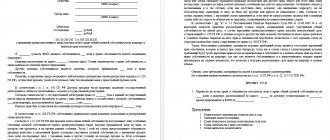Situations often arise when the owner of a share in an apartment shared with family members decides to sell his property. The law allows such a transaction, however, it is not so easy to implement it in practice, since citizens belonging to the category of other homeowners have an initial advantage associated with the acquisition of the remaining square meters. A notarized waiver of the pre-emptive right to purchase can resolve the issue. Having received it from loved ones, you will receive the right to dispose of property without legal restrictions.
Waiver of preemptive right to purchase
Pre-emptive right: what is it?
The term of interest refers to the right that each co-owner of a home has to buy the share that is being sold first, even before the property is put up for sale.
The law prohibits the creation of unbearable financial conditions for relatives who want to purchase a share of real estate, in order to avoid the need to part with residential meters in their favor, and only then sell the square meters to outsiders at acceptable price agreements.
Civil Code of the Russian Federation Article 250. Preemptive right of purchase
Thus, the conditions for notification of price changes are imposed on the citizen selling part of the housing:
- as relatives;
- as well as other possible participants in the transaction.
If you refuse to comply with the requirement, the transaction carried out subsequently will not acquire the status of valid.
The right of first refusal is often abbreviated as “first priority.”
You cannot sell the same share you own at different prices for co-owners and outside buyers, since such prejudice is punishable by law
Rules for selling shares
The law states that you have the right to sell your own share in the apartment to a person of your choice who has sufficient funds to meet your financial requirements and wants to buy a share of the housing. However, the seller must first ensure that the other owners of the property:
- they do not claim this share, and agree to share the space with a stranger;
- do not have the opportunity to purchase your share due to their insufficiently strong financial situation.
Selling a share of housing today is not so easy, since for its trouble-free sale it is necessary to obtain a waiver of the pre-emptive right to purchase of all other co-owners of the residential property
Be that as it may, any reason for refusing to purchase a share must be accompanied by an official renunciation of the priority right given to him by law. It is not enough to say verbally “I refuse,” or to draw up a statement of appropriate content and endorse it with your own signature.
No, you need to seek help from a notary, who will assist in drawing up a waiver in accordance with the law, which will subsequently relieve all parties to the transaction from:
- disputes regarding the legality of the sale;
- other disagreements.
It is not enough to express your consent to the sale of the share out loud; you must go to a notary and, under his supervision, write a statement of appropriate content, which is called a refusal
All issues related to the registration of a refusal, as well as other nuances accompanying it, are regulated by such a regulatory act as the Civil Code of Russia.
The requirement to notarize transactions made regarding shares common to several homeowners came into force only in July 2021, since this method was the only way for the preliminary and final elimination of subsequent disagreements between the parties and mass litigation.
Please note: it happens that co-owners of an apartment constantly live in another city. And sometimes you may even lose contact with them. Therefore, two years ago, adjustments that are still in effect today came into force, according to which an owner who wants to sell his square meters must notify his loved ones about this by posting an advertisement electronically on the website of the state organization that registers the rights of Russians to own real estate.
If you used this method, attach a statement to the package of official papers that other homeowners have been notified of the incident in a similar way.
If you can’t get in touch with other owners of shared housing, place a corresponding announcement on the Rosreestr website. If your relatives do not see it, in this case the law will not prevent the sale
Notification of share sale
Having decided to sell his own share, the person who owns it is obliged to draw up a notice according to the rules for other owners of the apartment, indicating in the text the cost of the area put up for sale.
This document must be drawn up in written form. After completing this task, send the paper by registered mail, not forgetting to order a list of attachments. It, as well as the receipt and subsequent notifications of delivery of documents will further confirm the formalization of consent or refusal of the primary right to purchase, taking into account all legal norms, at least on your part.
The notice in question does not have a set form and is drawn up arbitrarily according to general rules. You can see a sample document in the picture below.
Sample of drawing up a notice of sale of a share
Allocation of square meters
It’s great when the housing documents clearly state the share that belongs to you. For example, you are the owner of one of the rooms with such and such a number of meters.
When the footage is not indicated, but only the ratio relative to the total area of the property is called, in order to draw up a notice and, in principle, conduct a transaction for the sale of property, it is necessary to:
- allocation of a specific area;
- assigning this area to oneself.
This task is carried out through the court. Most often, court officials meet applicants halfway, since the law does not prohibit this. However, remember that the number of meters you own cannot be named arbitrarily; everything must remain within the law.
Provided that space in a communal apartment is being sold, the person who owns part of it will need to send a request to the Federal State Registration Service in order to obtain information about the owners of other premises.
Please note that the extract provided in this case by Rosreestr is paid, and therefore the request itself must be made immediately after payment for this public service.
To make it easier to sell part of the apartment and carry out the procedure for renouncing the priority right, it is necessary to allocate the exact part of your share of housing through the court
Commentary to Art. 250 Civil Code of the Russian Federation
1. If one of the co-owners sells his share to an outsider, the other participants have the preemptive right to purchase it at the price for which it is sold to a third party, and on other equal conditions. This rule was established in order to ensure the rights of co-owners, for whom the question of who will take the place of the retired co-owner is of no small importance. In addition, there may be a natural desire on their part to increase their share or become the sole owner of the property. The pre-emptive right does not apply when selling a share at a public auction, which is understandable, since the purpose of the auction is to sell the property to the one who offers the highest price for it. Co-owners can, on a general basis, take part in public auctions in order to acquire a share in the right of common ownership. Public auctions for the sale of a share, in the absence of the consent of all co-owners, can be held during foreclosure on the obligations of the owner (Article 255 of the Civil Code) and in other cases provided for by law. The pre-emptive right to purchase arises only in the event of a paid alienation of a share under a purchase and sale agreement, as well as in the alienation of a share under an exchange agreement, and only to an outsider who is not one of the participants in the common shared ownership. If a share is sold to one of the co-owners, the other co-owners lose the right of first refusal to purchase the alienated share and cannot make any claims against the seller.
2. When alienating a share to an outsider, the seller of the share is obliged to notify in writing the other participants in shared ownership of his intention, indicating the price and other conditions on which he is selling it. The law does not establish any requirements for such notice. This could be a letter, fax, telegram, etc. The main thing is that this requirement is met, and in the event of a controversial situation, the owner alienating his share can provide evidence of proper notification to other co-owners. In particular, in order to avoid problems in proving the fact of notification, it is proposed to carry out notification with the participation of a notary.
The legislator also does not determine in what form the refusal should be made. In the legal literature, two positions have been expressed on this issue. The refusal must be made either in writing, like the notice itself, or in the same form that is required for concluding a transaction for the alienation of property. The Law on State Registration (Clause 1, Article 24) contains a provision according to which the application for state registration may be accompanied by documents confirming the refusal of the remaining participants in shared ownership to purchase a share and drawn up by the body carrying out state registration of rights or notarized.
3. The period within which co-owners can respond to an offer to purchase is one month for the sale of a share in the ownership of real estate and ten days for the sale of a share in the ownership of movable property. These deadlines begin to run from the day the participants in shared ownership are notified of the intention to sell the share. These are the periods of existence of the right, and not the limitation period, therefore they are not subject to suspension, interruption, or restoration.
The refusal of the co-owners to purchase or their silence within the specified time frame means that the co-owner-seller has the right to sell the share to any third party at the specified price and on other conditions specified in the notice.
4. Failure to comply with the established rule, i.e. the sale of a share in violation of the pre-emptive right of purchase belonging to other co-owners does not mean the invalidity of the transaction. However, any participant in shared ownership has the right, within three months, to demand in court the transfer of the rights and obligations of the buyer to him. M. Zimeleva also pointed out that “violation of the right of first refusal is not a reason to challenge the transaction, since the claim based on this violation is not aimed at declaring it invalid, that is, at destroying the results of the sale, but only at putting the plaintiff in place of the buyer, that is, to replace one of the parties to the transaction" (Zimeleva M. Common property in Soviet civil law // Scientific notes of VIYUN. M., 1941. Issue 2. P. 59).
Other participants in the common shared ownership may also demand the transfer of the rights and obligations of the buyer to themselves when the co-owner alienating the share has changed the price or other terms of the sale agreement compared to those specified in the notice.
Judicial practice proceeds from the fact that the three-month period for filing a corresponding claim is preemptive and cannot be extended or restored even if it is missed for good reasons (clause 20 of the Supreme Arbitration Court Resolution No. 8). It is hardly possible to agree with such an interpretation. A more correct opinion seems to be, considered traditional in the legal literature, according to which this is a shortened statute of limitations, to which the rules on both extension and restoration are applicable.
The limitation period should be calculated according to general rules, i.e. from the moment when the person learned or should have learned about the violation of his preemptive right to purchase a share alienated by another co-owner, and not from the moment the alienation transaction was completed, since the rules contained in the commented chapter do not establish special rules for calculating the limitation period.
5. The preemptive right to purchase the alienated share can only be exercised by the co-owner himself, since the law establishes an imperative rule prohibiting the assignment of the preemptive right to anyone.
Registration of waiver of pre-emptive right to purchase
Citizens who are co-owners of housing, the share of which is about to be sold, having received notification from you, must complete:
- or consent to purchase a share;
- or waiver of the priority right to purchase it.
In the second case, it is necessary, as we have already said, to draw up a refusal with a notary and send it to the owner of the square meters being sold by registered mail.
Please note: each co-owner of the property must submit a waiver. If you need to get it from four people, for example, then you have no right to sell a room after receiving three refusals. Until the required four documents are in hand, the share cannot go on public sale.
The waiver of the priority right to acquire a share must contain the following mandatory information:
- property address;
- a clear indication of the share, either in square meters or as a percentage of the total area of the dwelling;
- the cost of the share in national currency;
- the time period given for making a decision on the preferential purchase of residential meters;
- data of the citizen declaring his unwillingness to buy out the share from the co-owner;
- personal signature of the citizen;
- date of preparation of the document;
- seal of the notary certifying the submitted documentation.
An example of formalizing a refusal to purchase a share of an apartment in common ownership
Validity period for waiver of pre-emptive right to purchase a room
Having made a decision, you are obliged to offer to the co-owners of the property to buy out your own share, however, you should not wait for their decision longer than the period established by law. The period sought is 30 days. It is established at the legislative level, and implies that if you do not receive an answer within the required time frame, you can put a room or other part of your home up for open sale.
If the co-owners have not responded to the sent notifications, then a month after sending them, go to the notary and draw up a certificate that will indicate that:
- you acted within the law and actually sent notifications;
- other homeowners received them and were notified about everything.
So, in order to receive this paper, you need to submit to the notary:
- receipts received at the post office when sending official papers;
- copies of the notifications themselves sent to co-owners;
- notifications of receipt of letters.
As soon as the certificate is issued, the citizen selling part of the apartment can start an official sale of the area, and no longer to relatives.
To obtain a notarized certificate that you notified the co-owners of the property in accordance with all the rules, you need to provide the appropriate package of documents
Options for filing a waiver
First of all, the seller must prepare and provide to all co-owners a notice of sale with an offer to buy out the share. After this, other owners have several options for further actions. The simplest one is not to respond to the offer in any way for a month. As soon as this period expires, the seller can freely sell his share, since the co-owners did not take advantage of the offer to exercise the preemptive right.
However, the seller is not always willing to wait a whole month, especially if a potential buyer has already been found. In such a situation, he may ask to write a refusal in advance in order to conclude a deal as quickly as possible. There are also several options for filing a refusal:
- Compose the refusal in writing and hand it over to the seller personally. The simplest and most accessible method, but not relevant if the co-owner is on a business trip, on vacation, and so on (out of town).
- Draw up a refusal and send it to the seller’s residential address by registered mail with notification. This is relevant when the person refusing is located in another locality or simply does not have the opportunity to personally hand over the document to the seller.
- Together with the seller, visit the Rosreestr branch and write a refusal there. The most reliable, but also the most complex option, therefore it is rarely used. Few of those who refuse will agree to waste their time visiting Rosreestr.
Selling without consent
It is possible to sell owned square meters of any housing without obtaining the consent of the owners if they ignored the notifications received.
However, it may be that the co-owners will agree to buy the room. Then you can respond to the notification in a non-official manner (send a letter back, fill out an application, etc.).
It is necessary to begin concluding a purchase and sale agreement as quickly as possible
But what to do if there are many apartment owners and they all expressed a desire to purchase the meters put up for sale? The law provides two legal ways out of the situation.
Table 1. What you can do in a situation where several co-owners want to buy out the space you own
| Method of action | Description |
| One buyer's choice | If it so happens that all the remaining homeowners immediately want to buy out the share, then you have the legal right to independently choose with whom you want to conclude a deal. |
| Proportional division | It is also possible for a situation in which a proportional division of the area is made between the remaining owners of the apartment who have expressed a desire to buy the square meters that belong to you. |
If only one buyer is selected among the owners, or he is the only one who responded to the stated offer, then before signing an agreement with him, it is necessary to officially re-notify the other homeowners about the transaction, who can:
- how to claim the share being sold;
- and not have any claims against her.
However, the notification is for informational purposes only; written consent to the sale will no longer be required in this case.
According to the letter of the law, you can choose the only buyer of the share yourself, or simply distribute it among all co-owners who want to buy it
The law provides for a refund of income tax on the purchase of an apartment in 2021. But you need to know that there are some restrictions on the maximum amount and period of circulation. There are many nuances that are important to know about, as they affect the ability to receive money from the state and the maximum amount. Read more in the special article.
Conducting a sale
Once you have identified the person who will subsequently become the owner of the home, you need to formalize a traditional purchase and sale transaction.
To conclude this according to the rules, you must collect the following documents to accompany the transaction:
- passport;
- property agreement;
- a certificate of absence of debts to the housing and communal services company;
- consent from neighbors, given in writing, that they are not against the procedure being performed;
- an extract from the Unified State Register confirming the right to own a share;
- technical type documentation.
Sample extract from USRN
Also, depending on the situation, you may need to provide these papers:
- marriage certificates;
- statement about the absence of property encumbrances;
- consent of the seller's official couple to sell the share.
Having collected these documents, proceed to drawing up the purchase and sale agreement. In this case, the text contains information about:
- number of meters sold;
- payment procedure for the purchase;
- parties who decided to enter into a transaction.
Real estate purchase and sale agreement
Deal with a minor child
It may be important to know that the transaction discussed in the article can also be concluded with minor Russian citizens. Before reaching 14 years of age, the child’s parents decide on this and also sign for him on the documentation; after 14 years of age, the child can endorse the official acts of sale independently.
Please note: the scheme of interest for the sale of housing seems impossible if permission from the guardianship authorities has not been previously obtained.
However, there is no guarantee that this government agency will give permission. Previously, employees of this official body will be required to make sure that the baby:
- owns a dwelling of similar size to the one being sold;
- will receive funds received from the sale of the share into a personal bank account, and will be able to manage the money after reaching legal age.
It will take the designated government agency 2 weeks to verify these conditions, after which you will receive the appropriate certificate.
According to the law, a transaction can be carried out with a minor child, but on the condition that it is approved by the guardianship and trusteeship authorities, which are obliged to monitor the procedure
Violation of the right of first refusal
Remember, if you violate the rules established by law related to the right of first refusal, the transaction may subsequently be declared invalid and can easily be challenged in court.
More often, problems arise in cases where co-owners of the property are not properly notified about:
- sale of shares;
- the value of the part of the joint property being sold.
Imagine that you haven't received a notification, but you want to buy a share. The law states that you are given another 3 months after you learn about the violation of the legal rights of the owner to return the priority right that belongs to you, even in a situation where the share has already been purchased and is registered in the name of a third-party buyer.
In addition, a transaction that:
- concluded between relatives;
- implied the use of maternity capital funds.
If the rights of minors were violated during the conclusion of the contract, and this was established during further clarification, the transaction is also declared illegal.
Violation of any rules related to the registration of waiver of the pre-emptive right to acquire a share in common property will result in you declaring all concluded transactions invalid
When is a refusal to purchase a share in an apartment necessary?
A waiver is needed when the apartment belongs to several persons at once. These can be either people connected with each other (for example, a family) or complete strangers (for example, in a communal apartment).
By law, co-owners have a preferential right to buy out a share. This means that if the owner plans to sell his part, he must first offer it to the co-owners and only then, if they refuse, sell it to third parties.
Conclusion
The period during which the waiver of pre-emptive right to purchase, issued by the co-owners of a particular home, is valid, gives a chance to quickly collect papers for the property owned and find a buyer from the outside, by issuing a message about an open sale. But it is worth understanding that if consent is not given by the persons mentioned, then it will be difficult to sell the room, since the buyer will still not be able to live only within its boundaries, and it is often too difficult to establish relationships with other residents.
Documents, costs and deadlines
When drawing up a refusal, a person will only need a passport or other identification document, as well as papers on the basis of which the owner owns a share in the same apartment, part of which is planned to be sold.
The refusal must be notarized. Such a service costs approximately 1.5-2 thousand rubles or more. The price greatly depends on the region where the refusal is issued.
The co-owner has exactly 1 month from the date of receipt of the offer to buy out a share in the apartment to make a final decision. After this period, refusal is no longer necessary.









